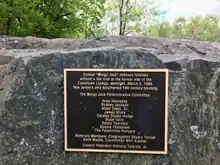Mingo Jack | |
|---|---|
| Born | Samuel Johnson 1820 |
| Died | March 5, 1886 (aged 66) |
| Known for | Lynching victim |
Samuel "Mingo Jack" Johnson (1820 – March 5, 1886) was an African American man falsely accused of rape. He was brutally beaten and hanged by a mob of white men in Eatontown, New Jersey.
Biography
Johnson was born in Colts Neck in 1820 and was raised as a slave by the Laird family. Because he was short, the family used him as a jockey, and he rode a colt named Chief Mingo to victory, earning him the nickname Mingo Jack.[1] In 1840, New Jersey abolished slavery, and Johnson worked odd jobs in the Eatontown and Middletown areas, living in Eatontown near what is now Route 35 and Poplar Road.
Lynching
On Friday, March 5, 1886, a white woman, Angelina Herbert, was raped and beaten. She could not identify her attacker but reported that he had asked her, "Do you know Mingo Jack?"[2] The town constable immediately arrested Johnson and locked him up inside the town's small brick jailhouse. Shortly before midnight, a mob of 12 to 20 men[2] gathered outside the jail, fired a pistol through the window, and wielded a pickax and sledgehammer to break down the heavy door. The mob brutally beat and clubbed Johnson, breaking his skull and gouging out one eye before hanging him from the bars across the jailhouse window.[3] Discovered the following day, Johnson's remains were interred in the cemetery of the African Methodist Episcopal Church of Eatontown.[4]
A sham trial for some members of the lynch mob was held, featuring drunken witnesses and a jury that included prominent resident Thomas White, resulting in acquittals for all the defendants. Evidence from the trial, including testimony from Mrs. Herbert, revealed that Johnson could not have been the rapist. No one was convicted for the murder of Johnson, who left behind a wife and five children.[5] Another black man, George or Richard Kearney, later confessed to the rape, although that confession may have been coerced.[6] Kearney later was hanged for the murder of another woman.[3]
In 2012, Mayor Gerald Tarantolo issued a public apology for the failure of security at the jail, calling the lynching "a low point in the history of Eatontown". A small memorial was placed in Wampum Park, commemorating Johnson's murder as one of the only lynchings in New Jersey state history.[2][7]

See also
References
- ↑ Howley, Dan. "Anniversary of 'Mingo Jack' lynching to be marked; Mingo Jack Remembrance Group to hold March 5 memorial gathering", Atlanticville News, March 3, 2011. Accessed December 26, 2017. "Born in Colts Neck in 1820, Johnson was abandoned by his parents and raised by a white family, the Lairds. The Lairds used Johnson as a slave, and because of his size — he was short and stocky — as a jockey."
- 1 2 3 Spahr, Rob (24 September 2012). "Lynching of former slave memorialized as 'low point' in Eatontown history". nj.com. Retrieved 24 December 2017.
- 1 2 Coyne, Kevin (1998-02-22). "The Lynching of Mingo Jack". Asbury Park Press. p. 41. Retrieved 2023-06-24.
- ↑ "Judge Lynch in New Jersey: "Mingo Jack" Hanged at the Eatontown Lockup". The New York Times. 1886-03-07. p. 2. Retrieved 2023-06-24.
- ↑ Stone, James (2010). The Murder of Mingo Jack: New Jersey's Only Nineteenth Century Lynching. iUniverse. ISBN 9781450213202.
- ↑ "George Kearney". New York Herald. 19 July 1998.
- ↑ English, Bob (27 September 2012). "Memorial Unveiled Near The Eatontown Location Of The Lynching Of Samuel "Mingo Jack" Johnson In 1888". Retrieved 24 December 2017.